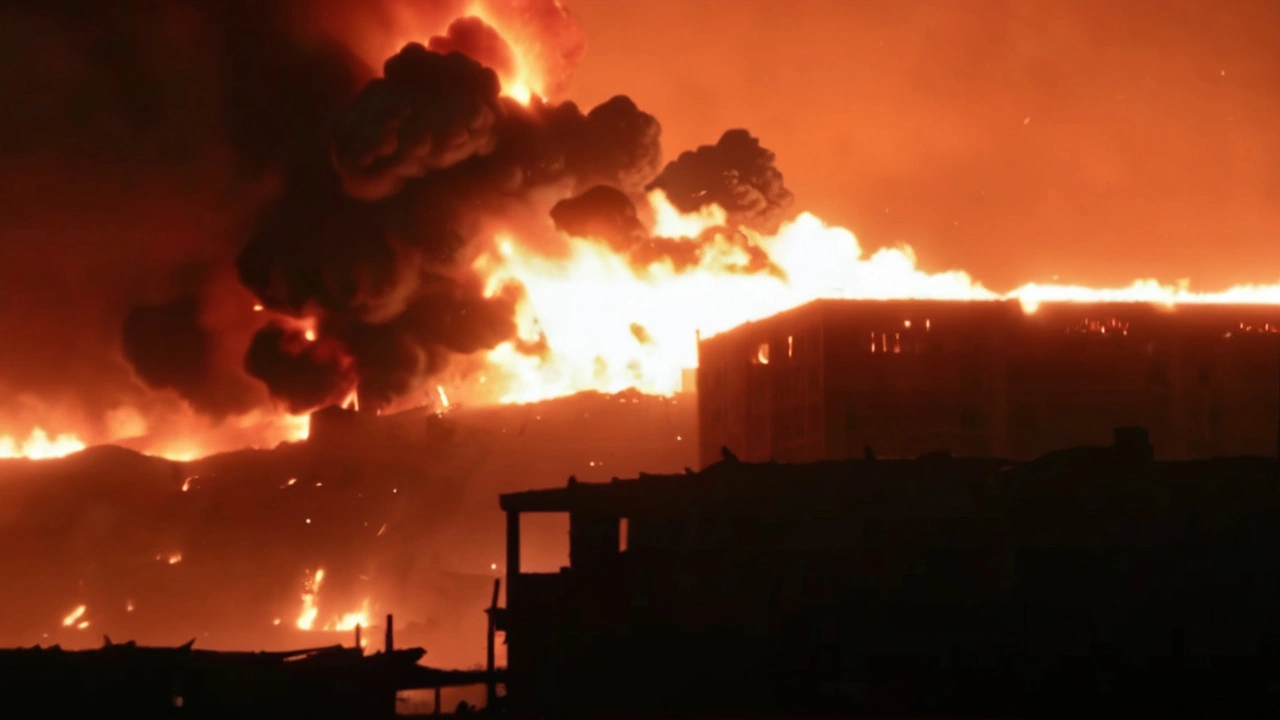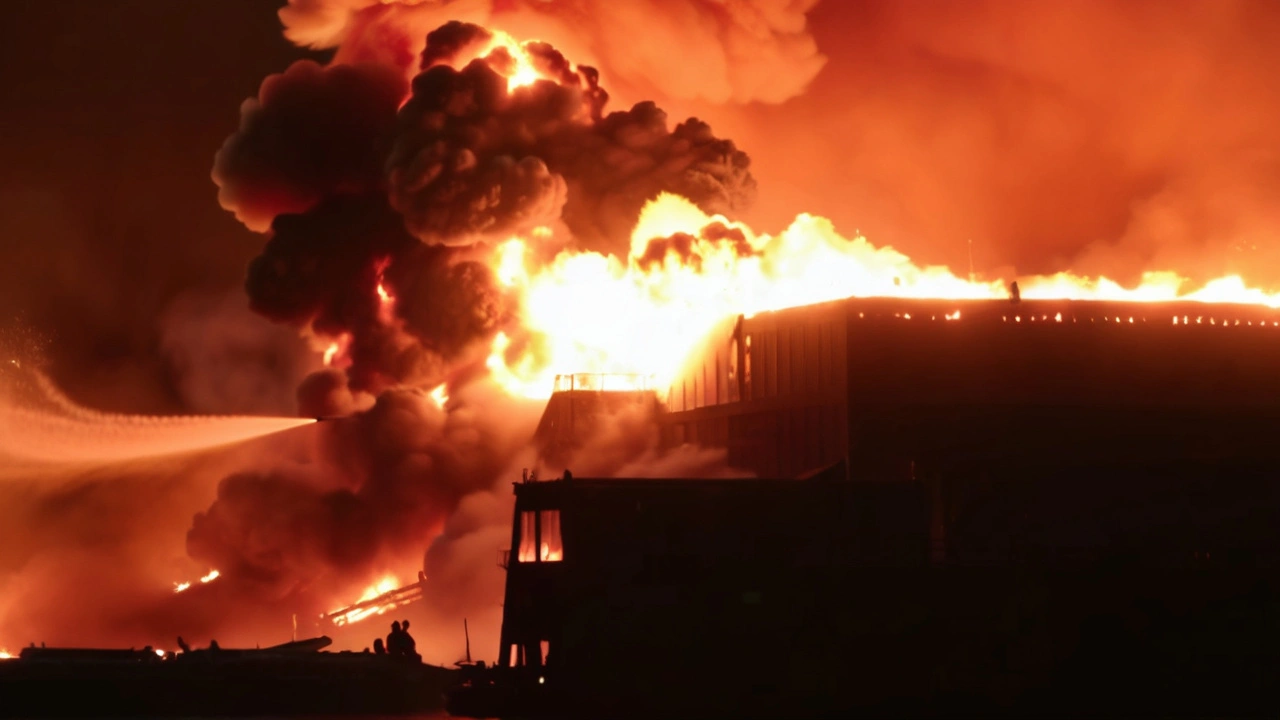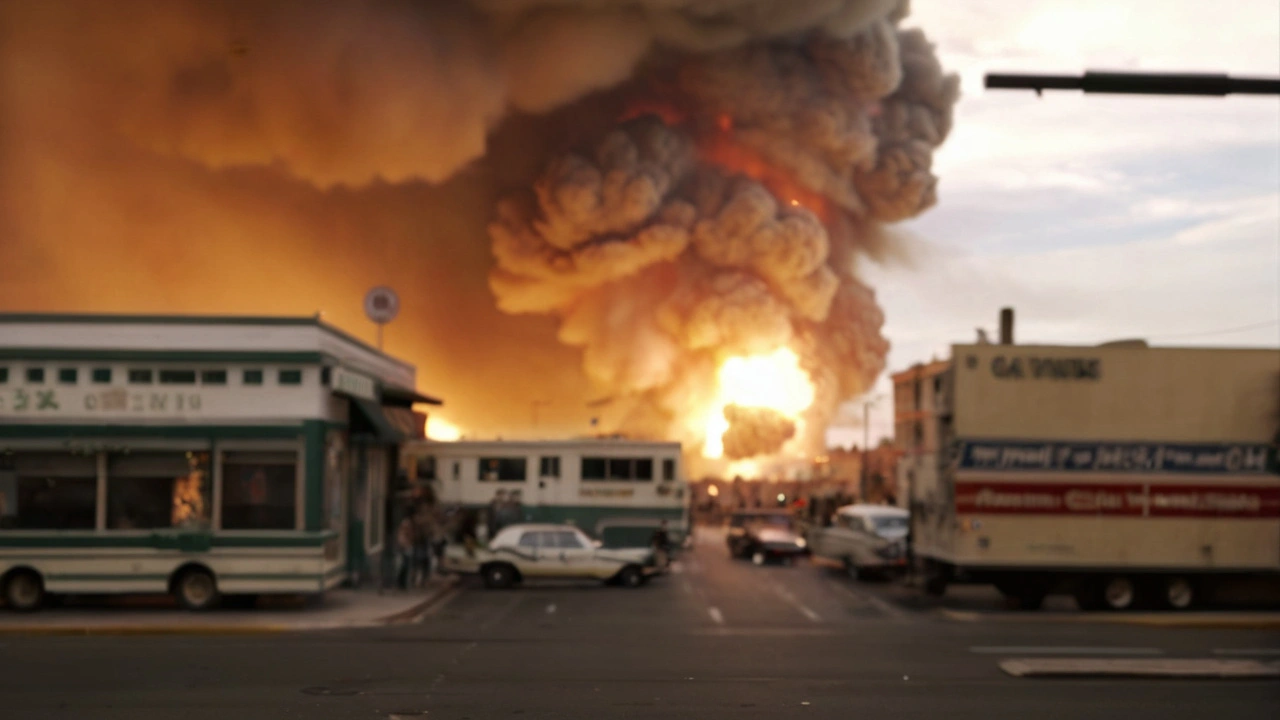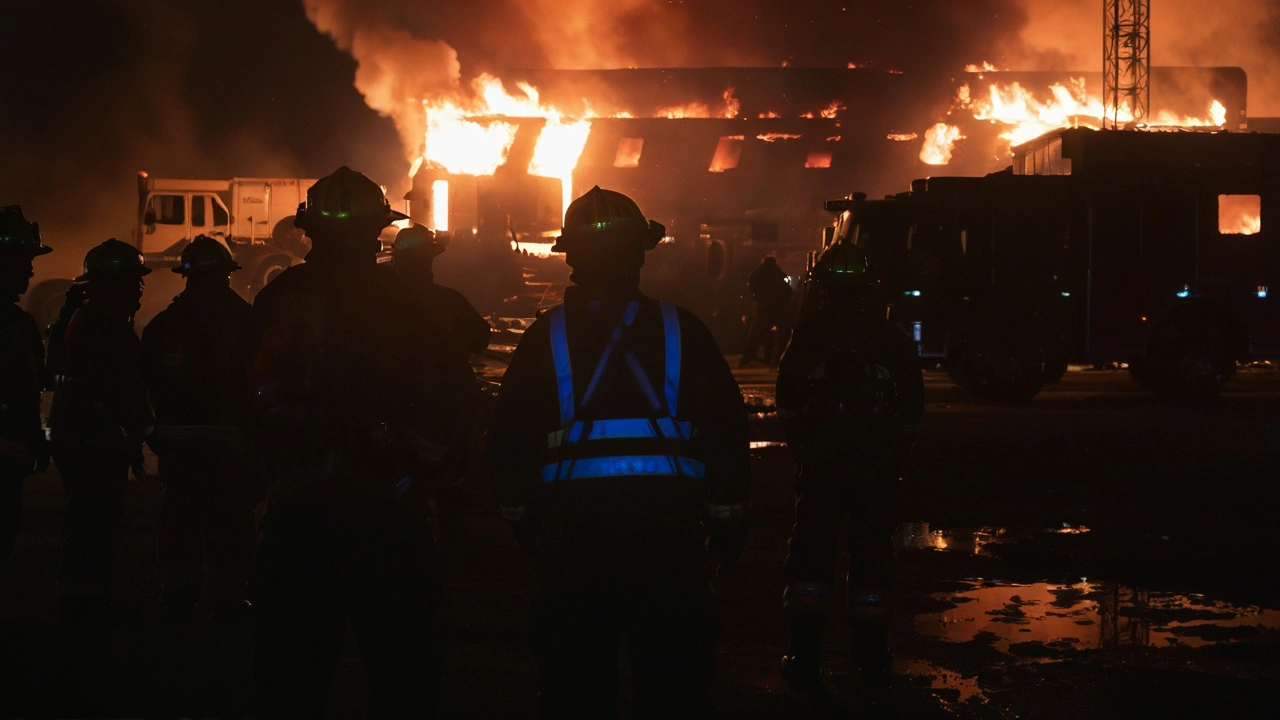Israel's Strategic Airstrike in Yemen: Disrupting Arms Supply to Houthi Militia
In a significant escalation of Middle Eastern hostilities, Israel confirmed that it conducted a major airstrike on the Hodeidah port in Yemen, aimed at blocking the supply of weapons to the Houthi militia. This strategic move by Israel occurred on Saturday evening, resulting in severe fires at oil and gas storage facilities, targeting an electrical substation, and causing considerable damage to the equipment used for cargo operations at the Yemeni port.

The Backdrop of the Conflict
The Hodeidah port, positioned on the Red Sea coast, is a critical logistical node for Yemen, facilitating the import of essential goods and food supplies. However, Israeli Prime Minister Benjamin Netanyahu has asserted that the port has been repurposed as a conduit for Iranian weapons directed towards the Houthi militants. These arms are then allegedly utilized to launch attacks not only on Israel but also on other Arab nations and regional entities.
The Israeli military action was prompted by a preceding drone attack conducted by Houthi forces on Israeli soil, which led to a fatality in Tel Aviv. The retaliatory airstrike by Israel underlines the delicate and volatile nature of the ongoing conflict in the region.

The Operation and Its Impact
The operation carried out by the Israeli air force stands out as one of the longest-distance missions in its history, with aircraft covering over 1,000 miles to reach their target. Advanced military assets, including U.S.-made F-15 and F-35 fighter jets, were deployed in this high-stakes mission. Following the airstrike, significant fires engulfed the port's oil and gas facilities, resulting in three deaths and over 80 injuries, with many victims suffering severe burns.
In addition to the human toll, the destruction of key infrastructure at Hodeidah port will likely exacerbate Yemen's ongoing humanitarian crisis. The airflow of essential items such as food and medical supplies is intricately linked to the port's operations, and any disruption directly affects the already dire living conditions faced by Yemen's civilian population.

International Reactions
The U.S. was quick to reaffirm its support for Israel following the strike. U.S. Defense Secretary Lloyd Austin emphasized America’s unwavering commitment to Israel's security and its inherent right to self-defense. This alignment underscores the geopolitical complexities and alliances influencing the region's turbulent dynamics.
Meanwhile, the Houthis did not remain silent. Reports confirm that they launched another missile towards southern Israel on Sunday morning. Fortunately, Israeli air defenses intercepted the projectile before it could cause any damage. This incident exemplifies the tit-for-tat military engagements between the two sides and highlights the broader regional implications.
Persistent Threats and Regional Stability
Recent months have seen a spate of aggressive actions by the Houthi forces, who are purported to have launched over 200 missiles and drones targeting Israel. Despite their efforts, most of these assaults have been successfully thwarted by Israeli and U.S. naval forces patrolling the Sea. The Houthis have also been implicated in attacks on commercial vessels navigating the Red Sea, a vital shipping lane that sees numerous maritime activities connecting Asia, the Middle East, Europe, and Africa. These actions threaten not only regional stability but also global maritime trade routes.
As of now, the airstrike on Hodeidah port marks a crucial turn in the conflict's trajectory, sparking debates about the efficacy of military intervention and its humanitarian repercussions. Israel's actions reflect its strategic priorities and security imperatives amid rising tensions and aggressive posturing by Houthi militias.
The Humanitarian Angle
The immediate fallout from the airstrike is most acutely felt by Yemeni civilians already battling starvation, disease, and infrastructural collapse. With Hodeidah being a central axis for supplies, the paralysis of port activities could have far-reaching humanitarian impacts. Aid agencies have long cautioned against strikes in such pivotal locations due to the potential for widespread civilian suffering.
Humanitarian organizations are now urgently calling for ceasefires and diplomatic resolutions to prevent further devastation. They stress that continued military actions will only deepen the crisis, pushing more Yemeni families into the abyss of poverty and hunger.
In summary, the Israeli airstrike on Yemen's Hodeidah port is a stark manifestation of overarching geopolitical tensions, proxy warfare, and the resulting humanitarian drama. With each strike and counter-strike, the region inches closer to a larger-scale confrontation, raising critical questions about conflict resolution and peacebuilding mechanisms in such a fraught landscape.

Eduardo Torres
July 21, 2024 AT 23:14The recent airstrike underscores how intertwined regional conflicts have become. Israel’s decision to target the port reflects its concerns over weapons flowing to hostile groups. While the operation may achieve short‑term goals, the humanitarian fallout cannot be ignored. It is essential for diplomatic channels to remain open to prevent further escalation. A balanced approach that addresses security and civilian needs is the only sustainable path.
Emanuel Hantig
July 22, 2024 AT 00:37Seeing the devastation in Hodeidah triggers a deep reflection on the cost of proxy wars. The loss of civilian lives is a stark reminder that strategic choices have human consequences. It is heartbreaking that ordinary families bear the brunt of geopolitical games. Yet, we must also consider the security fears that drive such bold moves :) A hopeful vision would involve stronger international mediation to break this cycle.
Byron Marcos Gonzalez
July 22, 2024 AT 02:01Behold the spectacle of far‑flung jets soaring over deserts, a ballet of steel and fire, the very embodiment of modern might, a dazzling display that would make the gods envious 😏
Chris Snyder
July 22, 2024 AT 03:24Indeed, the operation marked one of the longest-range missions for the Israeli Air Force, covering over a thousand miles to reach Hodeidah. The use of F‑15 and F‑35 aircraft demonstrates the logistical capabilities at play. It also highlights the collaboration with U.S. intelligence for targeting. However, the civilian casualties raise serious concerns about proportionality. The international community will likely scrutinize the aftermath closely. 🛩️
Hugh Fitzpatrick
July 22, 2024 AT 04:47Oh great, another brilliant idea to solve supply problems with fireworks.
george hernandez
July 22, 2024 AT 06:11While many celebrate the tactical success of striking a distant port, the broader canvas of human suffering paints a far grimmer picture. The flames that licked the oil tanks not only consumed fuel but also devoured the fragile hope of a starving populace. Every casualty recorded in the morgue adds another thread to the tapestry of tragedy that has been woven over years of war. The disruption of the Hodeidah supply line will reverberate through markets, inflating the price of already scarce foodstuffs. Children who once dreamed of a normal school day now stare at shattered skylines and hear the echo of distant explosions. The humanitarian agencies that have long operated in the shadows of conflict now face an uphill battle to deliver aid through a crippled port. Even the doctors overwhelmed by burn victims find themselves lacking essential medicines, a crisis that could have been mitigated with better planning. Moreover, the strategic calculus that justifies such a strike overlooks the principle that civilian infrastructure is a protected element under international law. In the long run, the loss of trust among local communities can foster deeper resentment toward the very actors that claim to protect them. The ripple effects will likely spread to neighboring regions, affecting trade routes that are vital for global commerce. The Red Sea, once a bustling artery of commerce, now bears the scars of militarized contention. Investors watching from afar may reassess the stability of supply chains, leading to economic tremors. Meanwhile, the political rhetoric back home often glorifies the operation without acknowledging the civilian cost. Such one‑sided narratives risk polarizing public opinion and stifling constructive dialogue. Ultimately, a sustainable resolution requires more than kinetic force; it demands inclusive diplomacy, humanitarian corridors, and a steadfast commitment to protecting innocent lives.
bob wang
July 22, 2024 AT 07:34In accordance with established international protocols, it is imperative to assess the proportionality of the strike, to weigh the strategic objectives against the inevitable civilian impact, and to uphold the principles of humanitarian law, which remain paramount in any conflict scenario, especially one as complex as the current Middle Eastern theatre. The deployment of advanced aircraft, including the F‑15 and F‑35, showcases a high level of technological capability, yet it simultaneously underscores the responsibility that accompanies such power. It is therefore advisable for all parties to engage in transparent dialogue, to mitigate further escalation, and to prioritize the protection of non‑combatants. The resultant humanitarian concerns merit immediate attention from global organizations, and a coordinated response would serve to alleviate the suffering of those most affected. 🌍
Seyi Aina
July 22, 2024 AT 08:57Look, the whole thing just feels like another excuse to flex military muscles while the locals get the raw end of the deal. Not impressed.
Alyson Gray
July 22, 2024 AT 10:21My heart is breakin’ watching the smoke rise over Hodeidah, like a dark cloud o’er a child’s playground. The news talks about 'strategic objectives' but what about the familes who lose everything? It’s just horrible, definetly not somethin’ we should take lightly. The world needs to hear the screams, not just the fancy jargon. 😢
Shaun Collins
July 22, 2024 AT 11:44Another war show, same old story, nothing new.
Chris Ward
July 22, 2024 AT 13:07Honestly, I think people are getting way to worked up about this. It's just a single strike in a long series of events, not the end of the world.
Heather Stoelting
July 22, 2024 AT 14:31We can do better and help the people in Yemen
Travis Cossairt
July 22, 2024 AT 15:54Seems like the strike will mess up supplies but maybe it'll stop some weapons from moving
Amanda Friar
July 22, 2024 AT 17:17The genius plan of hitting a civilian port to cut off weapons, while ignoring the resulting humanitarian crisis, showcases a remarkable level of strategic blind‑spot. It's a textbook example of how not to balance security with human rights.
Sivaprasad Rajana
July 22, 2024 AT 18:41The airstrike hit a port that ships goods, so people there will have trouble getting food and medicine. This can make the problem worse for those who already live in need.
Andrew Wilchak
July 22, 2024 AT 20:04Yo, that was low‑key reckless.
Roland Baber
July 22, 2024 AT 21:27Considering the broader implications, one can argue that any military action in such a densely populated area inevitably carries civilian risk. Yet, the pursuit of security should not eclipse the moral duty to protect innocent lives. A balanced policy would involve clear rules of engagement, rigorous target verification, and immediate humanitarian assistance following the operation. By integrating diplomatic efforts with measured force, the cycle of retaliation may be broken, fostering a more stable environment for all parties involved.